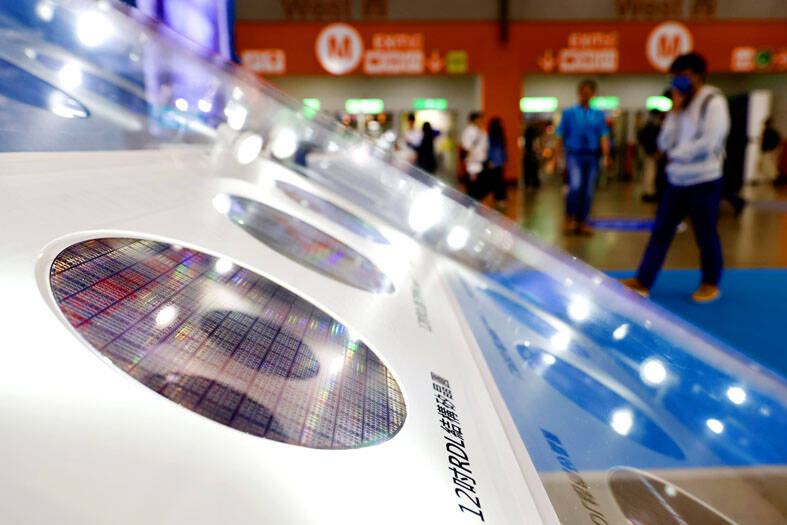Phoenix Silicon International Corp (昇陽半導體), the world’s No. 2 supplier of reclaimed wafers, on Friday said it planned to more than double its capital expenditures for this year to NT$7.9 billion (US$264.1 million), up from the NT$3.53 billion budget approved by the company’s board of directors in December last year.
As the company accelerates its capacity expansion, its annual reclaimed wafer output is expected to grow about 35 percent year-on-year to 850,000 wafers per month, up from 650,000 wafers last year, it said in a statement.
Monthly capacity is projected to surge 41 percent next year, reaching 1.2 million wafers, it said.

Photo: Ritchie B. Tongo, EPA-EFE
“Demand for artificial intelligence [AI] and high-performance computing applications is surging, driving rapid interest for front-end process technologies and back-end packaging,” Phoenix chief executive officer Tony Tsai (蔡幸川) said in the statement.
“The supply chain is being pushed on two fronts: technology upgrades and capacity expansion. Our rising capital expenditures indicate we are progressing well in line with customers’ growth,” he said.
Phoenix reported that net profit for the first half of this year surged 98 percent to NT$330 million, up from NT$166 million a year earlier, with earnings per share rising to NT$1.91 from NT$0.96, the company said in a filing with the Taiwan Stock Exchange.
Gross margin also improved significantly, rising to 35 percent in the first half from 23.2 percent a year earlier, the filing said.
AI chips produced using leading-edge process technologies consume more reclaimed wafers than those made on older nodes, as their fabrication requires more delicate processing and extensive equipment testing to ensure optimal yields, Phoenix said.
The consumption of reclaimed wafers is expected to rise further as customers ramp up production of 2-nanometer chips later this year, the company said.
Although Phoenix did not disclose specific customers, Taiwan Semiconductor Manufacturing Co (台積電) is the only chipmaker in the world scheduled to begin producing 2-nanometer chips this year.

SEMICONDUCTORS: The German laser and plasma generator company will expand its local services as its specialized offerings support Taiwan’s semiconductor industries Trumpf SE + Co KG, a global leader in supplying laser technology and plasma generators used in chip production, is expanding its investments in Taiwan in an effort to deeply integrate into the global semiconductor supply chain in the pursuit of growth. The company, headquartered in Ditzingen, Germany, has invested significantly in a newly inaugurated regional technical center for plasma generators in Taoyuan, its latest expansion in Taiwan after being engaged in various industries for more than 25 years. The center, the first of its kind Trumpf built outside Germany, aims to serve customers from Taiwan, Japan, Southeast Asia and South Korea,

Gasoline and diesel prices at domestic fuel stations are to fall NT$0.2 per liter this week, down for a second consecutive week, CPC Corp, Taiwan (台灣中油) and Formosa Petrochemical Corp (台塑石化) announced yesterday. Effective today, gasoline prices at CPC and Formosa stations are to drop to NT$26.4, NT$27.9 and NT$29.9 per liter for 92, 95 and 98-octane unleaded gasoline respectively, the companies said in separate statements. The price of premium diesel is to fall to NT$24.8 per liter at CPC stations and NT$24.6 at Formosa pumps, they said. The price adjustments came even as international crude oil prices rose last week, as traders

SIZE MATTERS: TSMC started phasing out 8-inch wafer production last year, while Samsung is more aggressively retiring 8-inch capacity, TrendForce said Chipmakers are expected to raise prices of 8-inch wafers by up to 20 percent this year on concern over supply constraints as major contract chipmakers Taiwan Semiconductor Manufacturing Co (TSMC, 台積電) and Samsung Electronics Co gradually retire less advanced wafer capacity, TrendForce Corp (集邦科技) said yesterday. It is the first significant across-the-board price hike since a global semiconductor correction in 2023, the Taipei-based market researcher said in a report. Global 8-inch wafer capacity slid 0.3 percent year-on-year last year, although 8-inch wafer prices still hovered at relatively stable levels throughout the year, TrendForce said. The downward trend is expected to continue this year,

Taiwan Semiconductor Manufacturing Co (TSMC, 台積電), which supplies advanced chips to Nvidia Corp and Apple Inc, yesterday reported NT$1.046 trillion (US$33.1 billion) in revenue for last quarter, driven by constantly strong demand for artificial intelligence (AI) chips, falling in the upper end of its forecast. Based on TSMC’s financial guidance, revenue would expand about 22 percent sequentially to the range from US$32.2 billion to US$33.4 billion during the final quarter of 2024, it told investors in October last year. Last year in total, revenue jumped 31.61 percent to NT$3.81 trillion, compared with NT$2.89 trillion generated in the year before, according to